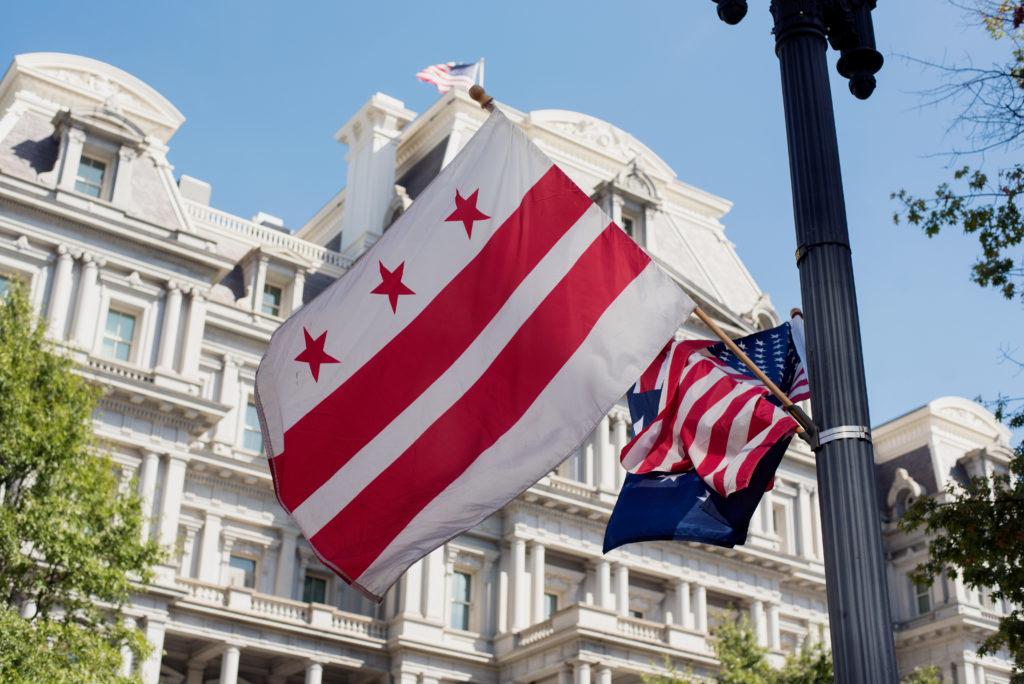University President Thomas LeBlanc joined three D.C. college presidents Wednesday in advocating for D.C. statehood leading up to the first congressional hearing on the issue in 25 years.
The four presidents wrote letters to the House of Representatives’ Committee on Oversight and Reform to push for statehood in light of the committee’s hearing Thursday, during which the committee heard testimony from D.C. councilmembers and Mayor Muriel Bowser. The presidents argued that D.C. statehood would allow their institutions to use congressional representation to obtain federal grants for research.
LeBlanc addressed his letter to committee chairman Rep. Elijah Cummings, D-Md. and Rep. Jim Jordan, R-Ohio – the ranking member, or most senior Republican member of the committee. LeBlanc said in the letter that D.C. statehood would expand the breadth of research the University could conduct because GW could request federal research grants.
LeBlanc announced at a town hall meeting earlier this month that research is one of the pillars of his strategic plan.
“We have long been crucial partners with the government in this work,” LeBlanc said in the letter. “However, our lack of representation at the federal level stifles this progress and our ability to contribute solutions to our country’s most difficult challenges.”
Del. Eleanor Holmes Norton, D-D.C., represents D.C. as a nonvoting member of Congress but can serve and vote on committees. In January, Norton and 155 cosponsors introduced H.R. 51, a bill that would make D.C. a state.
A Gallup poll released this summer found that most U.S. citizens reject D.C. statehood. Norton said in a July statement that scarce support for statehood reinforces the idea that many citizens are not aware of the District’s lack of congressional representation.
Presidents from Georgetown, American and Trinity Washington universities wrote letters to Cummings and Jordan expressing their support, because many of their students and alumni who still live in the District aren’t represented in Congress.
Each D.C. councilmember – except Ward 3 Councilmember Mary Cheh and Ward 2 Councilmember Jack Evans, who is the subject of an ongoing ethics investigations by the Council and the FBI – and Mayor Bowser testified at the hearing, The Washington Post reported Thursday.
Jordan moved to subpoena Evans, citing his ongoing ethics investigation, but Norton, D-D.C., said Evans’ ethical issues are not relevant to the D.C. statehood hearing. The House will hold a separate hearing to discuss the investigations, The Post reported.
Ryan McDevitt, the director of federal government relations, said LeBlanc and several D.C. university presidents discussed supporting statehood leading up to the hearing. McDevitt said he is “pleased” that other universities expressed support alongside GW.
He said the hearing was a “momentous step” to achieving representation for the 700,000 District residents who are not fully represented in Congress.
“We are hopeful this hearing will help raise the issue with people who previously had not given it much thought,” McDevitt said. “This is a top priority for Mayor Muriel Bowser and Congresswoman Eleanor Holmes Norton. We thank them for their dedication on this issue and are confident they will continue to advance its progress.”
Georgetown University President John DeGioia said in his letter that the House hearing on the bill would give District residents, including Georgetown alumni, a voice in all federal matters instead of only what the D.C. Council and Norton preside over.
“I am keenly aware of the fact that, while we as a nation are engaged in the promoting and strengthening of democracy around the world, the full democratic rights of the District of Columbia have not been provided,” DeGioia said in the letter.
A Georgetown University spokesperson did not return a request for comment.
American University President Sylvia Burwell said in her letter that the statehood bill “echoes” democratic values like leadership and equality that AU was founded upon.
“Our students at American University hail from every state in the country, and our student body has been ranked first for political activism,” she said in the letter. “Many of our alumni are now residents of the District who are steadfast supporters of statehood and believe that it is long overdue.”
An AU spokesperson did not return a request for comment.
Patricia McGuire, the president of Trinity Washington University in the Edgewood neighborhood, said she did not speak with other university presidents when writing her letter, but the Consortium of Universities – an association of 17 colleges and universities in the D.C. area – encouraged D.C. university presidents to publicly back statehood.
She said this week’s hearings were the “most well-organized and professionally staged” she has seen since she started pushing for D.C. statehood in the 1970s.
“I hope that the hearing at least created a strong public record for continuing advocacy,” McGuire said. “I am realistic about the dim chances for any real legislation moving beyond the House, but it’s very important to be on the record and to have a unified voice advocating for voting rights for D.C. citizens.”
Matthew Oberstaedt, the GW chapter leader for Students for D.C. Statehood, which relaunched last year, said prominent D.C. leaders advocating for statehood will signify to House leaders that residents are pushing for the issue. Oberstaedt said GW’s chapter of Students for D.C. Statehood tables in Kogan Plaza about once per week to educate students about statehood and organizes lobbying trips to Congress.
He said that D.C. students typically don’t register to vote in the District because they prefer to vote in their home elections where they have representation.
“What we really need more than anything is people from outside of D.C. to write to their senators and representative saying that they support statehood because they’re the ones who have senators and representatives they can write to,” Oberstaedt said.





